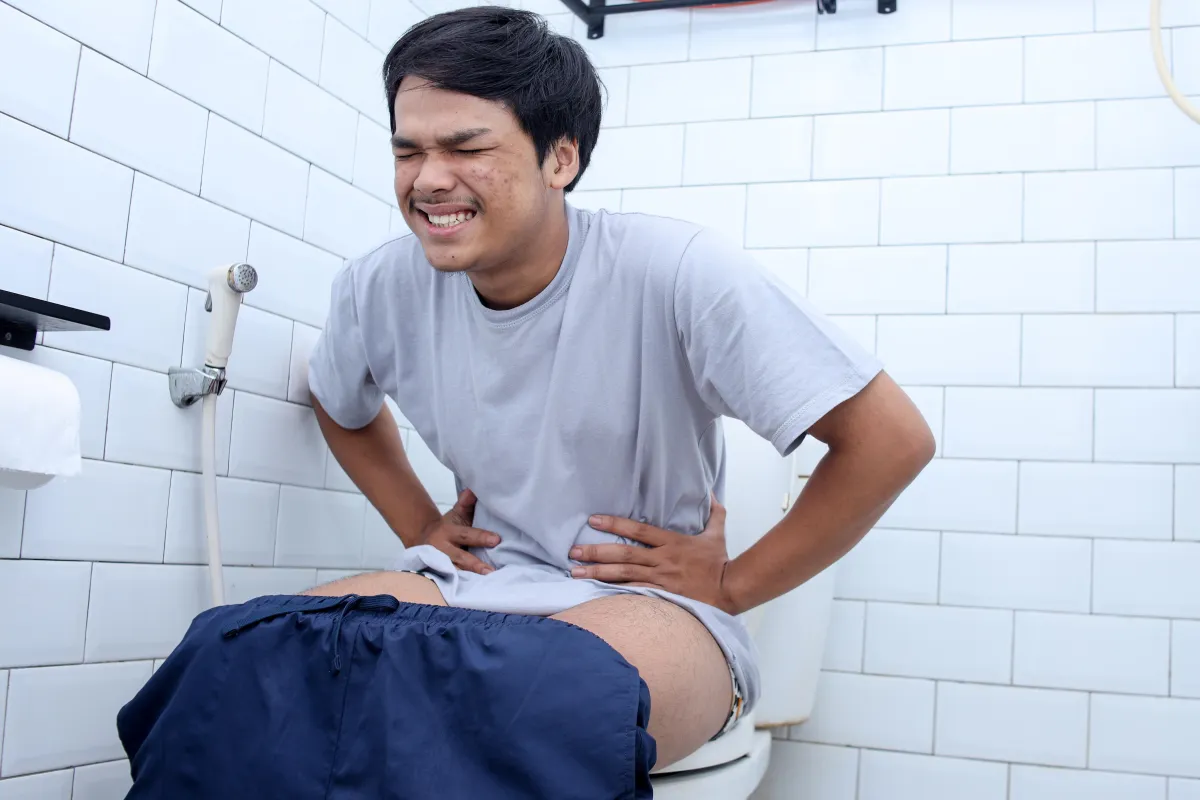Constipation: Gut Health
Constipation is a digestive condition causing infrequent, difficult bowel movements, often managed with diet, hydration, exercise, and medical interventions if persistent.

Description of Constipation:
Constipation is a common digestive condition characterized by infrequent or difficult bowel movements. It often results in hard and dry stools that are painful or challenging to pass.
Symptoms:
Fewer than three bowel movements per week. Difficulties in passing stools, often requiring straining. Hard, dry, or lumpy stools. A feeling of incomplete bowel evacuation. Abdominal discomfort or bloating. In some cases, small pellet-like stools (often referred to as "rabbit droppings").
Causes:
Dietary Factors: Low fiber intake or inadequate water consumption can lead to constipation. Fiber helps add bulk to stools, and water helps soften them, making them easier to pass.
Lifestyle Factors: Lack of physical activity can slow down the digestive system.
Medical Conditions: Conditions like irritable bowel syndrome (IBS), diabetes, thyroid disorders, and neurological diseases can cause constipation.
Medications: Certain medications, including antacids containing calcium or aluminum, opioids, and some antidepressants, can slow bowel movements.
Gut Flora Imbalance: A deficiency in beneficial gut bacteria can affect stool formation and expulsion.
Behavioural Factors: Changes in routine, such as travel, can contribute to constipation due to shifts in eating patterns and stress.
Delayed Bathroom Trips: Ignoring the urge to have a bowel movement can lead to harder stools and more severe constipation over time.
Potential Treatments:
Diet and Lifestyle Modifications: Increase intake of dietary fiber through fruits, vegetables, and whole grains. Ensure adequate hydration by drinking plenty of water. Engage in regular physical exercise to stimulate digestion.
Bathroom Habits: Establish a regular time each day for bowel movements. Use techniques such as the rocking squat for stimulating bowel movements.
Laxatives: Laxatives can help stimulate bowel movements and include over-the-counter options like osmotic agents that draw water into the bowel.
Probiotics: Taking probiotics can help restore healthy gut flora, aiding digestion and regular bowel movements.
Enemas: Enemas can be used for quick relief of stubborn constipation, helping to cleanse the bowel of compacted stool.
Medical Consultation: If constipation is persistent and severe or accompanied by sudden changes, medical advice should be sought, as it could indicate underlying health conditions.
Natural Remedies: Some people find relief with natural remedies like warm baths, abdominal massages, and the use of oils on the skin to help alleviate constipation. Treatment should be tailored to the individual, considering the underlying causes of their constipation. If symptoms persist, seeking medical advice is recommended to rule out serious underlying conditions.
Role of Gut Imbalances in Constipation:
Gut imbalances play a crucial role in the development of constipation. Constipation, characterized by infrequent bowel movements and difficulty passing stool, can often be a direct result of an imbalance in the gut microbiota.
Beneficial bacteria in the gut, such as Bifidobacteria and certain strains of E. coli, are vital for forming and eliminating stool effectively. These bacteria produce specific enzymes and other substances necessary for proper stool formation.
They stimulate the bowel wall to secrete mucus, which lubricates the gut and facilitates the efficient transit of stool. When there is an imbalance in these beneficial bacteria, these functions are compromised, and the body may struggle to form and expel stool properly.
Disruption to the gut flora, often referred to as dysbiosis, leads to inadequate stool formation and a lack of necessary signals required for the bowels to produce mucus. This insufficiency means less lubrication and subsequently, more difficulty in stool passage, manifesting as constipation. Individuals suffering from Gut and Psychology Syndrome (GAPS), whether children or adults, frequently show such imbalances in their gut flora, leading to chronic constipation issues. Addressing constipation typically involves restoring the balance of gut bacteria.
This is often achieved through dietary interventions that encourage the growth of beneficial bacteria and the use of probiotic supplements to directly replenish these essential microorganisms. In summary, maintaining a healthy gut microbiome is critical for preventing constipation. Supporting gut health through proper nutrition and possibly probiotics can help ensure efficient digestion and regularity in bowel movements.
Restore gut function and ease symptoms of constipation
Restoring gut function and easing symptoms of constipation involves a multi-faceted approach focusing on diet, supplementation, and lifestyle changes.
Dietary Changes: Incorporating fiber-rich foods such as fruits, vegetables, and whole grains is vital to enhance gut function and alleviate constipation. Additionally, integrating fermented foods like sauerkraut juice and juices from other fermented vegetables can promote the growth of beneficial gut bacteria. For those with chronic severe constipation, consider avoiding high-protein dairy products, which might exacerbate the condition, and opt instead for high-fat dairy options like sour cream, ghee, and butter.
Probiotic Supplementation: Taking therapeutic probiotics can significantly help in repopulating the gut with beneficial bacteria, crucial for proper stool formation and elimination.
Enemas: In stubborn cases, enemas can provide rapid relief by clearing out impacted stools and reducing toxins.
Hydration: Ensuring adequate fluid intake throughout the day is necessary to keep the digestive system hydrated, facilitating easier stool passage.
Exercise: While strenuous physical activity may be needed for a significant effect on relieving constipation, maintaining regular moderate exercise can generally support digestive health.
Abdominal Massage and Warm Baths: Enjoying a warm bath, possibly enhanced with Epsom salt or baking soda, followed by an abdominal massage using oils like Udo’s oil or hemp oil, can relieve constipation symptoms.
Consult Healthcare Providers: Persistent constipation or associated severe symptoms should be evaluated by a healthcare provider to rule out underlying conditions such as diabetes or thyroid issues. By implementing these strategies comprehensively, individuals can aid in restoring gut function and alleviating the symptoms of constipation. It is important to consult healthcare professionals before initiating any new treatment to ensure suitability and safety.
